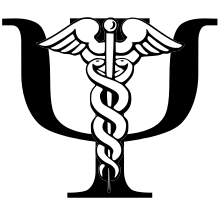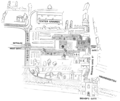Portal:Psychiatry
The Psychiatry Portal Psychiatry is the medical specialty devoted to the diagnosis, prevention, and treatment of deleterious mental conditions. These include various matters related to mood, behaviour, cognition, perceptions, and emotions. Initial psychiatric assessment of a person begins with creating a case history and conducting a mental status examination. Physical examinations, psychological tests, and laboratory tests may be conducted. On occasion, neuroimaging or other neurophysiological studies are performed. Mental disorders are diagnosed in accordance with diagnostic manuals such as the International Classification of Diseases (ICD), edited by the World Health Organization (WHO), and the Diagnostic and Statistical Manual of Mental Disorders (DSM), published by the American Psychiatric Association (APA). The fifth edition of the DSM (DSM-5), published in May 2013, reorganized the categories of disorders and added newer information and insights consistent with current research. Treatment may include psychotropics (psychiatric medicines) and psychotherapy, and also other modalities such as assertive community treatment, community reinforcement, substance-abuse treatment, and supported employment. Treatment may be delivered on an inpatient or outpatient basis, depending on the severity of functional impairment or risk to the individual or community. Research within psychiatry is conducted on an interdisciplinary basis with other professionals, such as epidemiologists, nurses, social workers, occupational therapists, and clinical psychologists. (Full article...) Selected article Anti-psychiatry originates in an objection to what some view as dangerous treatments. Examples include electroconvulsive therapy, insulin shock therapy, brain lobotomy, and the over-prescription of potentially dangerous pharmaceutical drugs. An immediate concern lies in the significant increase in prescribing psychiatric drugs for children. There were also concerns about mental health institutions. Every society, including liberal Western society, permits involuntary treatment or involuntary commitment of mental patients. (Full article...) Selected image Windows of a person showing symptoms of paranoia and persecutory delusions, symptoms of schizophrenia image credit: Schizophrenic window
WikiProjectsSelected biography Szasz argued that mental illnesses are not real in the sense that cancers are real. Except for a few identifiable brain diseases, such as Alzheimer's disease, there are “neither biological or chemical tests nor biopsy or necropsy findings for verifying or falsifying DSM diagnoses", i.e. there are no objective methods for detecting the presence or absence of mental illness.(Full article...) General imagesThe following are images from various psychiatry-related articles on Wikipedia.
Related portalsTopicsSubcategoriesAssociated WikimediaThe following Wikimedia Foundation sister projects provide more on this subject:
Discover Wikipedia using portals |

































